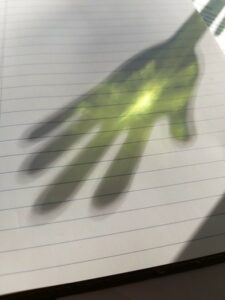 My high-five etug pen being reflected onto a lined piece of paper – listening, reflecting, writing are the dominant themes for now.
My high-five etug pen being reflected onto a lined piece of paper – listening, reflecting, writing are the dominant themes for now.
Not lots to report for this week. I had a few more interviews. There was no work for me to do on the Craft Services course so I spent my non-interview time downloading transcripts, reading through Widening our Doorways and looking through policies. The transcripts are not that easy to read so I may have to re-watch a couple of interview sections. I know I don’t remember everything I’ll want to capture. It was a good experience talking to people from all over the college and I could see a few common themes emerge between different areas.
I went back to the Blackboard Sampler course and set up a couple of folders for the Assessment and Grade Center content. I had kind of let that go for a while since it wasn’t high on my list of things to do. I’ll dig though the existing content I had to fill out those sections and I need to resize some images.
I learned that the issues that I had with registration have led to some changes coming to the web site. I know it wasn’t just me but people certainly heard about it. There are some other changes coming too and I’m looking forward to seeing them. Getting to things through the web site was an issue that kept coming up when talking about barriers to access.
I may have a chance to get in on some Equity, Diversity and Inclusion training for SCETUG next week. That will tie in nicely with what I’m doing.
That’s about it. Next week will be mostly reading and writing and possibly some follow up questions.